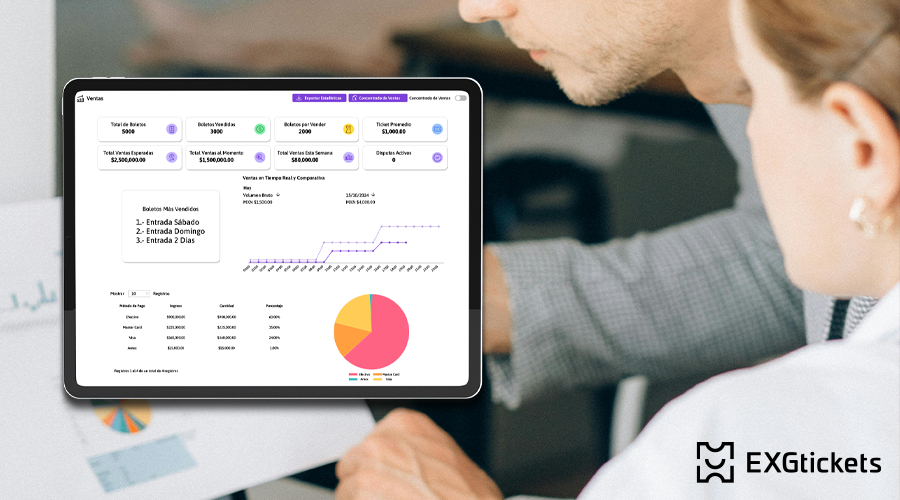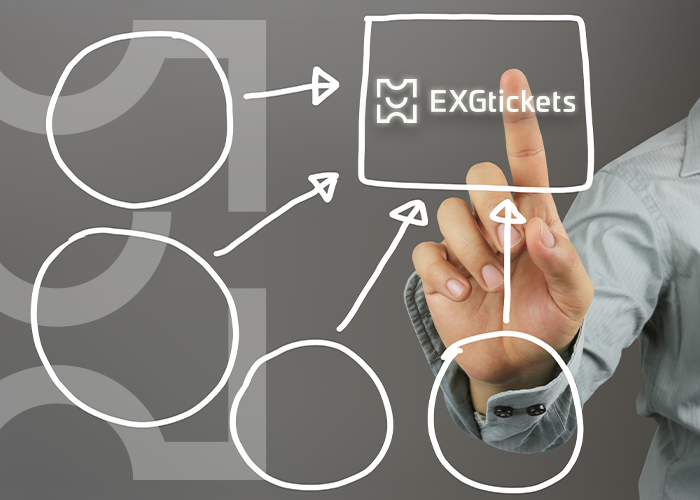
Importance of the data for the event organizer
Access to detailed attendee data allows organizers to optimize planning, the event experience, and marketing and sales strategies. EXGtickets knows this, and that's why it provides you with all this information, both in real time and pre-processed in graphs for easier reading, so you can easily export it for in-depth analysis.
Below, we discuss how each specific data type can be leveraged:
1. Age
Age is a key factor in understanding audience preferences.
Different age groups have distinct interests, allowing you to segment attendees more effectively. For example:
-
Content segmentation: Adjust the event program to be relevant to the predominant demographic public.
-
More targeted advertising: Advertising campaigns can be targeted to the most relevant age group, maximizing the return of investment (ROI).
-
Designing personalized experiences: For example, creating specific areas or activities toward younger or older audiences based on data.
2. Origin
Knowing the origin of the attendees offers key insights:
-
Geographic marketing strategies: If a majority of attendees come from a specific city, advertising investment can be directed toward that region.
-
Optimized logistics: Understanding where attendees are coming from makes it easier to plan transportation or translation, if necessary.
-
Localized Promotions: Develop targeted discounts to attract attendees from other regions.
3. Email
Email is a direct communication bridge with attendees:
-
Personalized email marketing: Invitations, confirmations, and important event updates can be sent.
-
Loyalty and retention: After the event, the email can be used to offer exclusive promotions for future events.
-
Feedback collection: Post-event surveys allow you to measure attendee satisfaction and improve future editions.
Payment Method
Analyzing the payment method used by attendees offers advantages such as:
-
Identifying preferences: Knowing which methods are most popular (credit cards, mobile payments, etc.) helps simplify the shopping experience.
-
Targeted Promotions: Offer specific discounts based on the payment method used.
-
Risk Management: Detect unusual patterns that may indicate fraud or technical problems.
5. Time of the Ticket Purchase
Data on the time of the day in which the tickets were purchased also provides valuable information:
-
Identifying trends: Knowing peak purchasing patterns helps plan future advertising campaigns.
-
Strategic promotional campaigns: Implementing limited-time promotions during peak business times can drive to more sales.
-
Operational planning: Anticipating last-minute peaks ensures that there is enough staff to manage the purchasing process.
6. Type of ticket purchased
The type of ticket allows you to segment attendees and maximize revenue:
-
Experience Optimization: Identifying which ticket types (VIP, general, etc.) sell the most helps you fine-tune services and resources.
-
Upselling y cross-selling: Ofrecer mejoras de boletos o productos complementarios a los asistentes interesados.
-
Space planning: Ensure that areas and services are appropriately designed for each attendee segment.
7. Device data
Knowing which devices and operating systems the tickets were purchased from provides technical and marketing advantages:
-
Digital optimization: Ensure the purchasing platform works perfectly on the most used devices.
-
Targeted advertising: Create campaigns targeted to users of certain devices or browsers.
-
Behavioral analysis: Identify patterns of technology use, such as preference for mobile devices, to adjust the strategy.

Global benefits of data analysis
Having a comprehensive view of attendees helps to:
1. Personalize the event experience: Design activities, services, and messages to meet the expectations of different segments.
2. Optimize marketing: Identify which channels, messages, and strategies work better.
3. Maximize revenue: Implement strategies such as dynamic pricing, upselling, or targeted promotions.
4. Plan more efficiently: Adjust resources, logistics, and staff based on detected trends.
5. Future forecasting: Use historical patterns to improve planning for future events.
In short, this data and much more that EXGtickets offers you not only allows to manage an event better, but also to create a more meaningful and profitable experience for attendees and the organizer. The key is to analyze and use this information strategically to improve every aspect of the event.
We invite you to learn about all the tools you can access with the platform by filling out this simple form.







